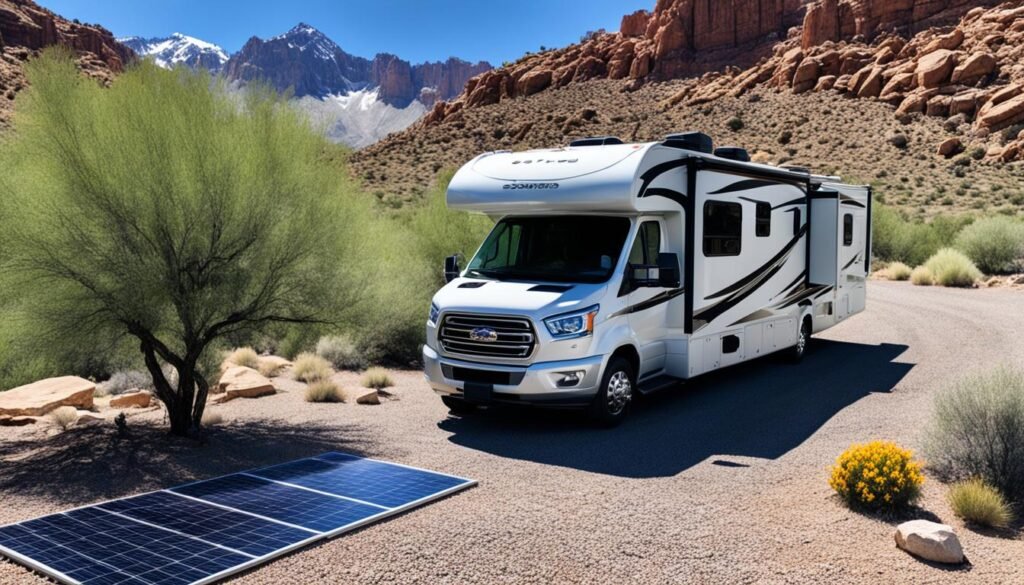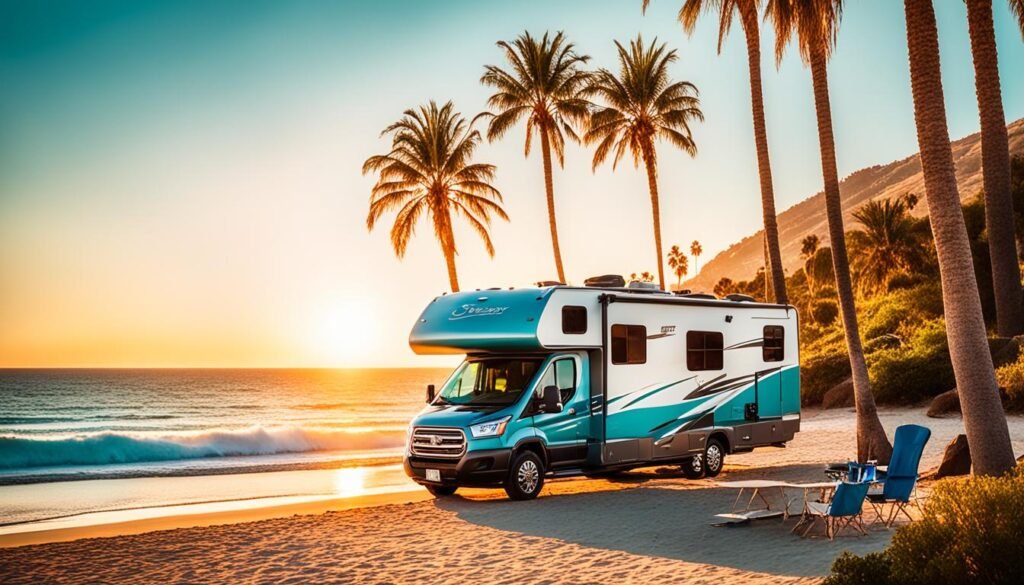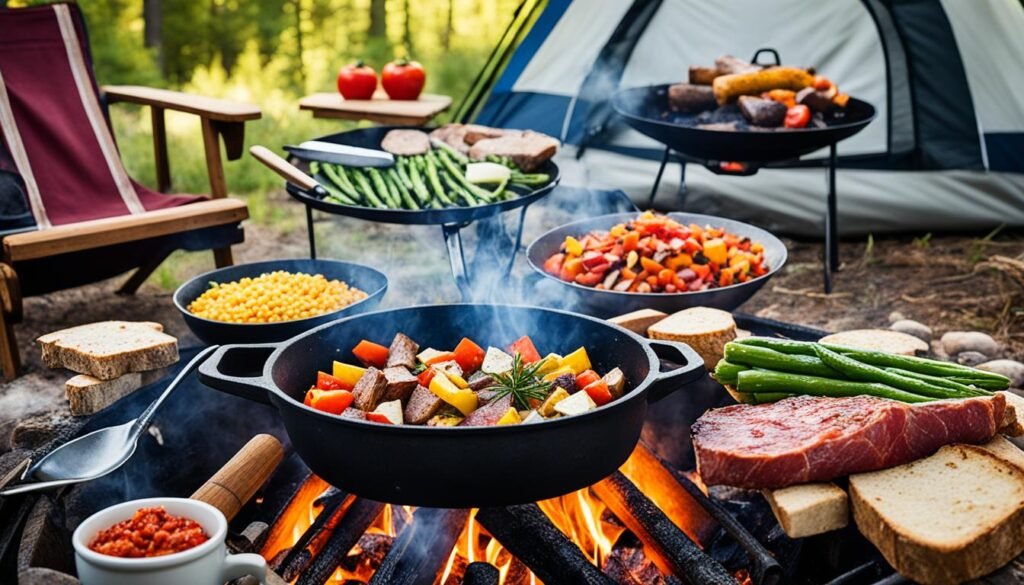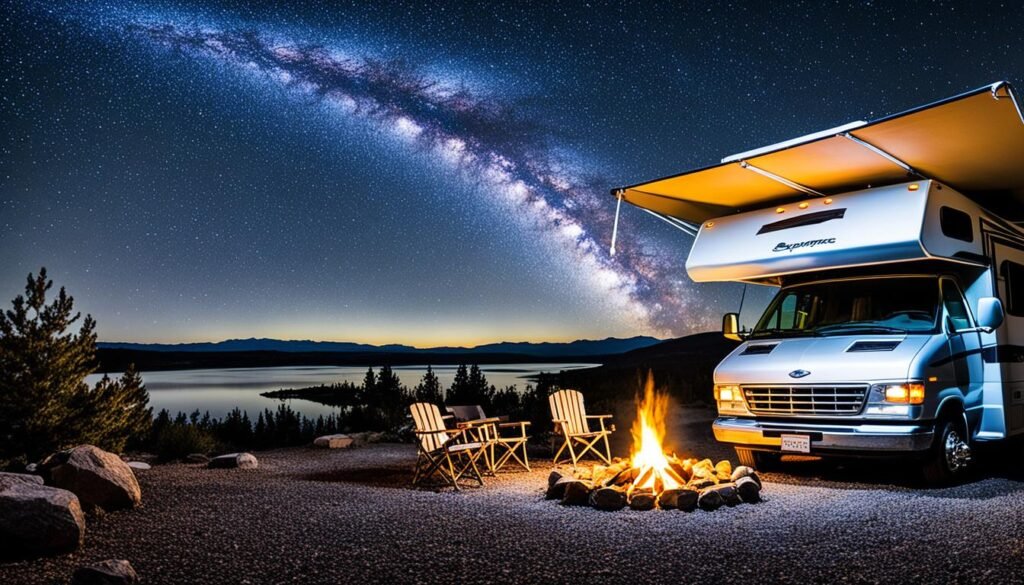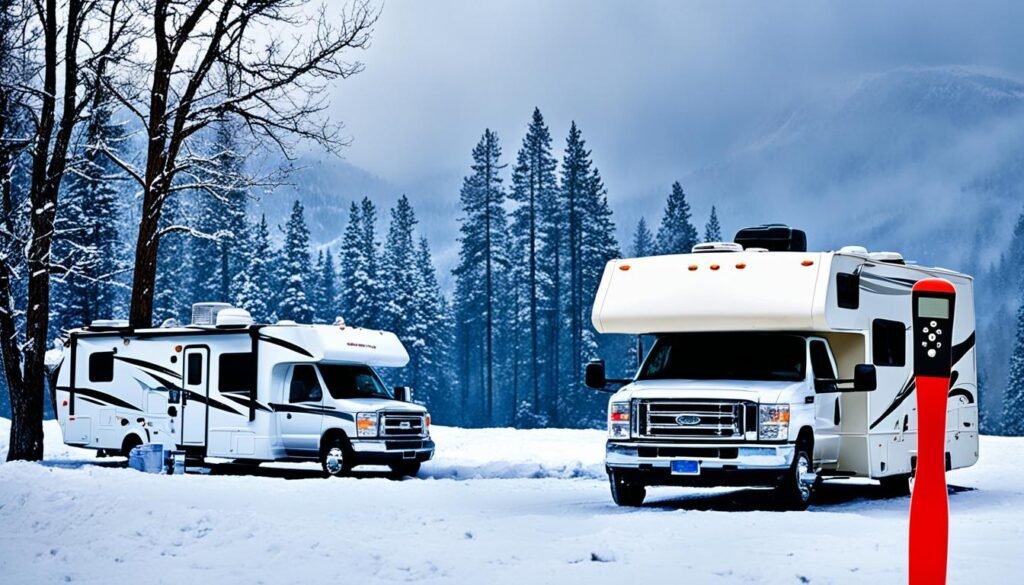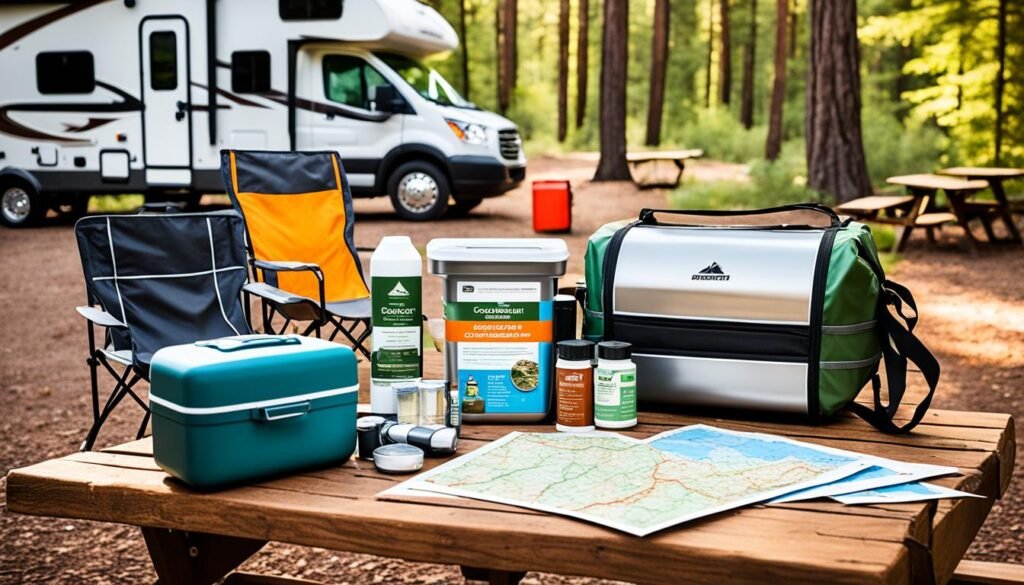Have you ever asked what dry RV camping is? In this article, I’ll unpack what dry camping or boondocking means. It’s for those wanting to adventure off-grid. Whether you are experienced or new to camping, learning about dry camping opens new doors.
Dry camping is when you camp without water, electricity, or sewage hookups. It’s an off-grid style for RV fans who love self-reliance. Instead of campground facilities, you use your own resources. It’s perfect for anyone wanting freedom and independence off the beaten track.
With dry camping, you can discover various spots. This includes lands managed by the Bureau of Land Management (BLM) or private areas. You get to pick your dream spot by the beach, in forests, or deserts. The right prep makes dry camping a chance to boost your camping joy.
Key Takeaways:
- Dry camping, also known as boondocking, is camping without any hookups for water, electricity, or sewage.
- It allows RVers to be self-sufficient and explore remote and pristine landscapes.
- Dry camping offers benefits such as cost savings, escape from civilization, and the freedom to travel without reservations.
- Proper planning and preparation are essential for a successful dry camping experience.
- Stay tuned to learn more about dry camping essentials, tips, and finding the perfect dry camping spot.
What is Dry Camping?
Dry camping, or boondocking, means camping without hookups for water, electricity, or sewer. It relies on the camper’s own resources. This type of camping lets you stay in wild and remote places. You get away from busy campgrounds.
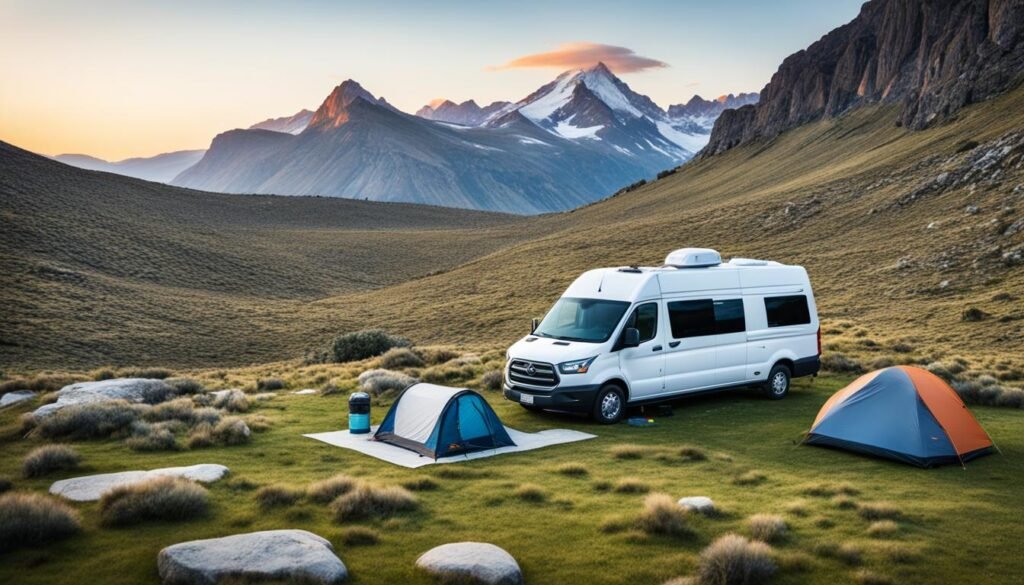
When dry camping, you rely on what you have in your RV. You won’t have access to external services. You need to save water, use power wisely, and handle waste carefully.
Dry camping lets you get away from daily noise and be with nature. It’s perfect for those who love adventure. You can camp in forests or by peaceful lakes. It’s a unique way to connect with the outdoors.
The Difference Between Dry Camping and Other Types of Camping
Dry camping differs from other camping styles, like those with full hookups. It’s about being independent and enjoying the off-grid life. Full hookups give you water, electricity, and sewer. RV parks have extra amenities like showers and Wi-Fi, which dry camping does not.
You can dry camp in many places, like public lands and national parks. These spots offer a chance to enjoy nature without the crowds. It’s a different way to camp.
To learn more about dry camping, visit Jackery’s blog post on dry camping. Find tips for a great dry camping trip there.
| Dry Camping | Full Hookups |
|---|---|
| Self-sufficient camping | Amenities available |
| Remote and untamed landscapes | Crowded campgrounds |
| Simplicity and sense of adventure | Convenience and comfort |
The Allure of Dry Camping
Dry camping is loved for its simple charm and adventure feel. It lets campers unplug from daily life and get close to nature. This camping style frees you to see untouched places away from busy sites. It’s a chance for alone time, peacefulness, and calm under the stars.
Dry camping means leaving the busy world to enjoy nature’s beauty. It’s time to refresh, start anew, and make lasting memories amid stunning scenes.
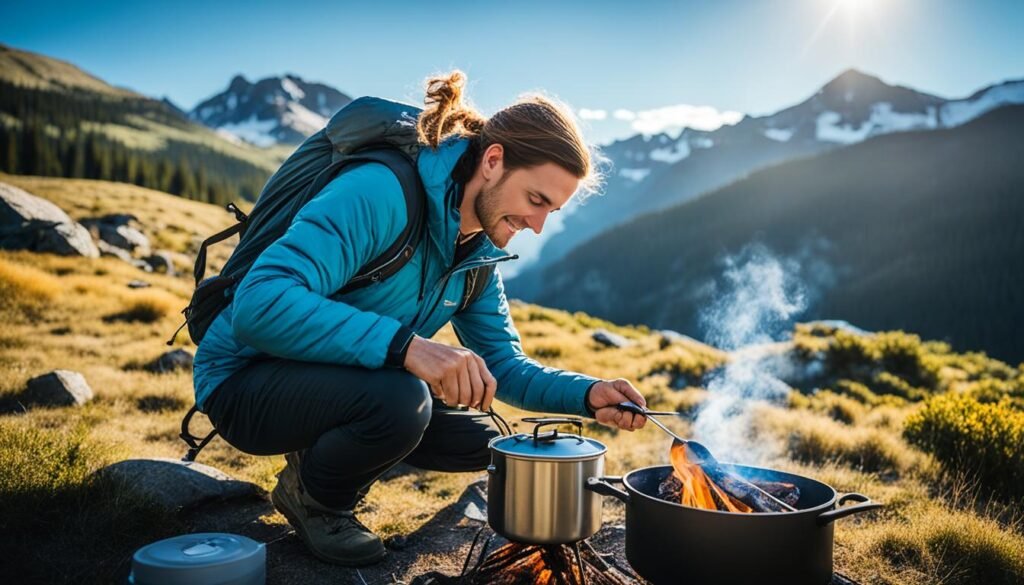
“Dry camping isn’t just about spending a night; it’s a journey to find secret wonders and admire nature’s beauty. It offers personal growth, deep thinking, and a bond with the untouched charm of the world. The freedom you feel with dry camping, becoming one with nature, and embracing adventure is unmatched.”
Dry camping lets you leave behind city noise and stress. Off-grid, the quiet of nature helps you relax fully. No loud noises, just the peaceful sounds of nature and a campfire.
Another joy of dry camping is seeing rare places. You’re not stuck in crowded areas but can explore hidden spots. From quiet mountain tops to clear lake shores, endless beauty awaits.
The Benefits of Disconnecting
A big plus of dry camping is breaking from tech’s grip. Without screens, you focus on nature’s beauty and friends or family. Having no Wi-Fi or cell signal seems hard at first. But it means real talk and stepping away from online life.
Essential Tips for Dry Camping Success
Being ready is a must for dry camping in an RV. These tips will help you enjoy off-grid camping:
- Prioritize water conservation: Saving water is crucial. Be mindful of how much water you use. Use water-saving tricks like quick showers and using biodegradable soaps. Recycling wastewater for flushing toilets or watering plants is also smart.
- Maximize energy efficiency: Use solar panels and LED lighting to enhance your camping. Solar panels provide renewable energy. LED lights use less energy and last longer than traditional bulbs.
- Practice responsible waste disposal: It’s important to dispose of waste properly. Always use designated waste containers. Make sure to dispose of trash and wastewater in the right places. Never leave waste in nature.
- Be prepared for limited cell service and internet connectivity: Remote areas often have poor cell service. Plan for this by having a backup communication method. Enjoying a break from technology can be refreshing.
- Prioritize safety: Always think about safety first. Carry essentials like a first aid kit and extra supplies. Knowing local rules helps keep your trip safe and fun.
- Embrace Leave No Trace principles: Protect nature by following Leave No Trace. This means taking your trash, respecting wildlife, and leaving places as you found them. It helps preserve the environment for others.
- Properly research and select suitable dry camping spots: Choosing where to camp requires research. Look for spots on public lands or in national parks. Check if you need permits or reservations.
Investing in Portable Solar Generators
A portable solar generator can make dry camping better. They use the sun to give you off-grid energy. You can keep devices charged and run RV systems with it. It’s good for the environment and handy for long trips.
Dry camping lets you reconnect with nature and live off-grid. By following these tips and caring about your impact, your adventure will be both joyful and successful.
Finding the Perfect Dry Camping Spot
There are many places to consider when looking for a dry camping spot. You might think about national forests, Bureau of Land Management (BLM) land, state parks, or even private property. Public lands managed by BLM and the United States Forest Service offer dispersed camping spots. To find good camping areas, you can use maps, guidebooks, and online sites. Always follow the rules and get any needed permits or reservations.
National forests are a top pick for those who love dry camping. These public lands have lots of space for camping in the wild. They also offer beautiful views, trails for hiking, and a chance to see wildlife. Camping in national forests means you can truly get away from it all.
“BLM land is another great choice for dry camping. Camping there often means you won’t have hookups. It’s key to leave no trace and obey any rules.”
State parks are another place to find dry camping spots, but options can vary. Some state parks have specific areas or simple campsites for RVers looking for a basic experience. To learn about dry camping in state parks, check their websites or talk to park staff.
Don’t overlook private property for dry camping if landowners allow it. Some landowners let RVers camp on their land, offering a private and special experience. Make sure to get permission and follow any rules the landowner has.
When looking for the best dry camping spot, use all the tools available. Sites like Campendium, Free Campsites, and AllStays are great for finding places. These resources offer reviews, photos, and info about what to expect, the rules, and how to get there.
Example of Dry Camping Spot Research Resources:
| Resource | Description |
|---|---|
| Campendium | A big online directory of campsites, including free spots and places for boondocking, with feedback from users. |
| Free Campsites | A website and app showing free camping spots on public lands, including places to boondock. |
| AllStays | A huge database with info on camping spots, including national and state parks, and boondocking places. |
Using these tools, RVers can find the perfect dry camping spot that fits what they want. Whether you’re after a peaceful place in a forest or a hidden spot on private property, there’s a lot to choose from. The adventures are endless.
Embracing the Adventure of Dry Camping
Dry camping opens up a world of adventure. It’s your chance to explore and find freedom. You could enjoy quietness in the wild, see stunning views, or watch stars under dark skies. Dry camping lets you step away from daily noise. It connects you with nature. This leads to creating lasting memories.
The Benefits of Dry Camping
Dry camping has unique perks unlike regular campgrounds. Here are a few benefits:
- Freedom: Dry camping means you can travel without needing hookups or reservations. It gives the joy of exploring freely.
- Cost Savings: Camping off-grid helps avoid fees and save on utilities. So, you can spend your money on other parts of your trip.
- Nature Immersion: You get to be fully in nature. This lets you enjoy its beauty, sounds, and calm.
- Privacy and Solitude: Find peace in remote spots, away from busy campgrounds. This brings quiet and privacy.
- Unforgettable Experiences: Discover hidden places off-grid. These can lead to amazing adventures you’ll always remember.
Start dry camping to discover new adventures in the outdoors.
General Rules for Boondocking
Enjoying a successful dry camping experience means following certain rules. These guidelines help protect the environment. They also ensure you and others have a good time.
Practicing Leave No Trace Principles
Practicing Leave No Trace is key in boondocking. It means caring for the natural surroundings. Make sure to leave the campsite as you found it. Throw trash away the right way. Keep noise down and avoid hurting plants or animals.
Respecting Wildlife and Their Habitats
It’s important to respect wildlife and their homes when camping. Watch animals from a distance. Don’t feed them or get too close to their homes. Keeping a good distance helps them live naturally.
Observing Quiet Hours
Respecting other campers is crucial in boondocking. Follow quiet hours, usually from dusk to dawn. This makes sure everyone has a peaceful time. Try to keep noise low at night so everyone can rest well.
Maintaining a Respectful Distance from Other Campers
Choosing a spot to camp, keep away from others’ spaces. This shows respect for their privacy. It helps everyone enjoy their own space peacefully.
Parking at Least 200 Feet from Water Bodies
Keeping water clean and quiet is important. When you park your RV, stay 200 feet from any water. This protects water and the animals living in it.
Properly Disposing of Wastewater
Follow the right steps to get rid of wastewater. Don’t pour dirty water on the ground or near water. Use dump stations or special places to throw it away. This keeps our environment and health safe.
Checking Local Regulations and Obtaining Permission
Before you camp, check the rules and get permission if needed. Some places have special camping rules. Always respect private property. Get permission before camping on someone’s land.
By following these general boondocking rules, you’ll have a great time camping.
Overnight Camping and Additional Resources
If you’re searching for a place to camp overnight, many options are out there for RV fans. Places like Cabelas, Camping World, and even Cracker Barrel might let RVs park overnight. This is handy and saves money for travelers. Also, rest stops and Walmart stores often have spots for RVs to park overnight. This lets campers take a break and get ready for the road ahead.
Also, there are lots of websites and apps that tell you about free camping spots. They include places to camp for free on public lands. Sites like Free Campsites and Campendium have lots of info and reviews from users. They help RVers find the best places for dry camping across the US. These tools are great for planning trips and making sure you have a good time camping.
If you need a quick place to stay or want to go on a bigger adventure, there are many options. These camping choices and extra resources can really help. They are great for RVers who want to see the world of dry camping.
FAQ
What does dry RV camping mean?
Dry RV camping, or boondocking, means camping with no hookups. This includes water, electricity, or sewage. It’s off-grid camping that lets RV lovers be independent and see remote places.
What is dry camping?
Dry camping is camping in an RV without hookups for water, electricity, or sewer. Campers use what’s on their RV to support themselves.
What are the benefits of dry camping?
Dry camping lets you see untouched places and save money. You get away from the city, and don’t need reservations.
How do I have a successful dry camping experience?
For good dry camping, save water and use energy wisely. Handle waste well, prep for no phones or internet, and stay safe. Follow Leave No Trace rules and pick the right spots.
Where can I find suitable dry camping spots?
You can camp dry in national forests, on BLM land, in state parks, and on private land. Use maps, books, and websites to find places.
What makes dry camping an appealing option?
Dry camping cuts you off from everyday noise, letting you bond with nature. Enjoy silence, see beauty, and find peace in nature.
What are the general rules for boondocking?
When boondocking, leave no trace and respect animals. Keep quiet at night, stay away from others, and camp far from water. Always follow local rules and get permission to camp.
Where can I find overnight dry camping spots?
Look for overnight spots at Cabelas, Camping World, Cracker Barrel, rest stops, and Walmart. Try Free Campsites and Campendium apps for free spots and boondocking on public lands.

